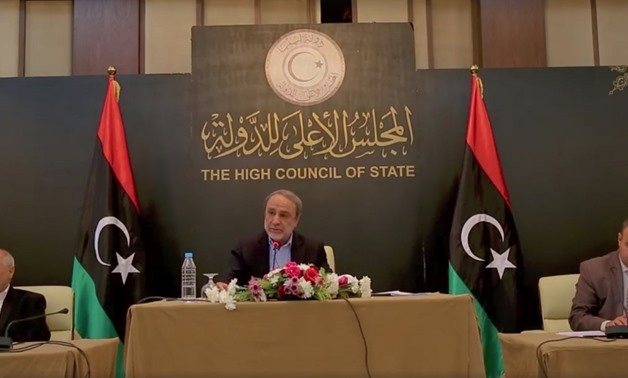
FILE- Libya’s High Council of State
CAIRO – 9 April 2018: The Muslim Brotherhood (MB) in Libya seems to still have high political ambitions, yearning to tighten their grip not just over one of the authorities or bodies inside the state, but over the office of the presidency as well. Electing the Justice and Construction Party candidate Khaled al-Mashry as the High Council of State's new head may be the first step towards seizing complete power over the country.
The Justice and Construction Party, which is known as being the MB group's political party inside Libya, tried more than once to take the State’s High Council presidency; however, they have failed for years. On Sunday April 8, Mashry, who is known as being affiliated with the MB group, succeeded to win the position with a total of 64 votes of the (attended) council members.

FILE- Libya’s High Council of State newly-elected head Khaled al-Mashry
Mashry’s fiercest rival was Abdul Rahman Sewehli, who won the council’s presidency twice in 2016 and 2017. However in 2018, he failed to be re-elected for the third time as he received only 45 votes. About 122 members attended the voting session and 13 were reported to be absent. Several other votes were dispersed among a small number of candidates.
The session in which Mashry won the presidency of Libya’s High Council of State was not the first voting session, since all of the candidates failed during the first session to win a "simple majority", estimated at 62 votes, according to the council’s regulations. Accordingly, the members held a second session, in which Mashry won the 64 votes.
Libya’s High Council of State was established in 2015 per the Skhirat Agreement signed in Morocco, December 2015. Three different political bodies were established due to the agreement; the High Council of State, Libya’s House of Representatives, and the Presidential Council headed by Fayez al-Sarraj.
 FILE- Libya’s High Council of State former head Abdul Rahman Sewehli
FILE- Libya’s High Council of State former head Abdul Rahman Sewehli
The Muslim Brotherhood has been seeking to appear and compete again in the Libyan political scene for years, according to several monitors and observers to the situation in Libya. They affirmed to media outlets that the Muslim Brotherhood has been choosing several new faces to compete with other politicians.
Sewehli, who lost the election in 2018, seems also to be planning to run in the presidential election expected to be held in 2018, although he hasn't announced it officially. Libya’s presidential election seems to contain a large number of competitors this year, especially with announcements of Saif al-Islam Gaddafi, son of the former Libyan president, and Aref Ali Nayed, to run in the presidential election.
Libya, which is struggling to get through the critical political situation it has been experiencing since 2011, is not only trying to unify its army, but is longing to revive its political functions by conducting presidential and legislative elections by mid-2018.
Despite the fact that no law has been issued regarding regulating the elections, solutions were suggested by politicians and presidential candidates in order to make sure elections will be conducted at the scheduled date. For instance, during an interview with Egypt Today on March 12, presidential candidate Nayed suggested making some amendments to the already-existing law to regulate elections. He argued that even the constitution is still disagreed upon by various Libyan factions.
Nayed was the first to announce his intentions to run for the presidency, followed by the son of the former Libyan president, who enjoys a large support base.
Since 2011, Libya has been witnessing severe devastating political escalations, which reached their climax with the emergence of the Islamic State (IS) terrorist group that has killed hundreds of innocent civilians. Their operations in Sirte were of particular gravity when the city was taken and turned into a stronghold for the terrorist group. The situation inside Libya became complex, and some politicians and experts felt there were no political means to reunify the country. Now however, with the aid and support of the Arab countries, Libya seems to be on the right track to achieving full political and civil rights.
Additional reporting by


Comments
Leave a Comment